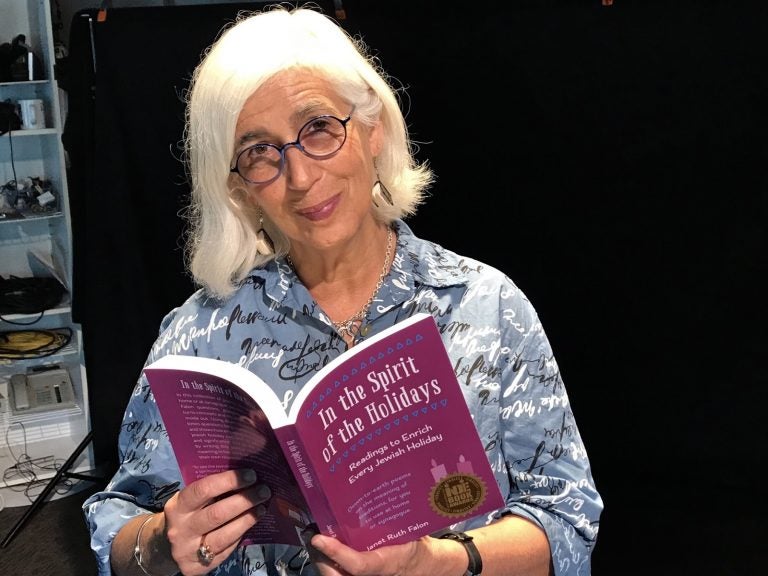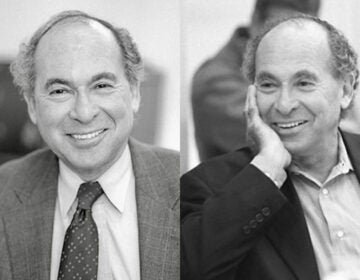Local poet writes about turning to faith, finding meaning during Jewish holidays
Janet Ruth Falon is a Philly area Jewish poet who uses the intersections of her identity to make meaning of the world.
Listen 6:31
Poet Janet Ruth Falon, author of "In the Spirit of the Holidays." (Jennifer Lynn/WHYY)
We’ve entered the season of Jewish high holidays: Rosh Hashanah, the Jewish New Year and Yom Kippur, a day of atonement.
Poet Janet Ruth Falon of Elkins Park writes about these holidays others celebrated throughout the year in the faith. Falon’s connection to her religion is channeled in her book “In the Spirit of the Holidays: Readings to Enrich Every Jewish Holiday.”
Falon says writing is critical to her finding meaning in her spirituality and other aspects of her life. She said difficulty starting a family tested her faith. She recently spoke about this and shared some of her work with WHYY Morning Edition host Jennifer Lynn.
Janet: I take my Judaism really seriously. And for me it’s trying to find meaning and to figure out, “Why am I doing these things?” My husband and I were trying to become parents and we were having a very, very hard time. We had a lot of really, you know, catastrophic things happen to us. By the way, happily, we finally adopted our daughter, who is great. But because things were going slowly and things were happening that just seemed to put up, you know, block after block after block, and we weren’t getting anywhere. I lost my faith. I think I lost my faith. I felt really estranged. But one of the things that happened, and this is what’s so great about this kind of writing for me, is that I wrote about it. There are poems in my book that are saying, “I’m angry with you God. You know, you owe me.” Which is blasphemous and some people will think that’s terrible. But by writing it, it allowed me to stay engaged. That’s what I wanted to throughout my life as a Jew, I want to stay engaged in some lively matter. And for me generally it’s writing.
Jennifer: So the holidays, Rosh Hashanah and Yom Kippur, they tie in with one another and these are the High Holy Days.
Janet: That’s right.
Jennifer: And Rosh Hashanah being the New Year celebration, Yom Kippur the Day of Atonement for sins or misgivings of the past year. Would you please share with us a couple of poems? Let’s start with one that pertains to Rosh Hashanah.
Janet: I’d be happy to do that. I’ll start with the poem called “Here I Am Again.” This is about every year, if you’re committed to being Jewish, you go to services and Rosh Hashanah. You just do it. And sometimes, you know, I think it’s the same old thing what’s going on. So this is what I wrote:
Here I am again.
This congregation.
The same room. These same prayers.
The same hopes and intentions, mostly, that I bring every year.
And yet I keep coming back
for another chance, another opportunity,
another beginning, that maybe this year
will be the one that makes the difference,
that this will be the year when I’m finally able
to cross off the big things from my list,
that I’ll do the to do’s
and stop the to-don’ts.
Some years it feels like nothing much is different,
that I’m still stuck on the same old stuff
so the year that’s ending must not have mattered
But it did; if I’m honest with myself
and consider all I’ve done,
I have moved on. If only a bit.
The year mattered.
After all the High Holy Days I’ve been through,
I now know that change isn’t always big
For most of us, change doesn’t come in neon colors accompanied by an
oom-pah band.
Mostly,
the changes I make are small enough to fit in my pocket
But they’re mine,
and along with a candy wrapper and a quarter for the meter
in my pocket
this year is full to overflowing.
Jennifer: Nice.
Janet: Thank you.
Jennifer: The year is about movement, isn’t it?
Janet: Yes it is. I think of years as cyclical, which is why I wrote a poem about Challah. Challah is the bread that you have on holidays and on Shabbat, generally speaking, is not round. But for the high holidays, it is round and I think it’s because it’s mimicking and referring to the cyclical nature of the year.
Jennifer: Yeah, Challah bread is so plump.
Janet: It’s so plump and so we have our favorites, but anyhow, there happens to be a kosher bakery in my neighborhood and one of the delights for me of the High Holiday season is the day before the holiday. The bakery sets up like a big stand outside their store and there are hundreds and hundreds of Challahs there and I love it. It’s really fun.
Jennifer: Can you read the Challah bread poem?
Janet: Sure. “Why the Rosh Hashanah Challah is round.”
A triangle wouldn’t work
or a rectangle, or square
They’re too full of angles
and corners to get stuck in
They’re too eager to settle down
and stay put, unable to move on their own
They’re too solid, and pointed,
with edges that poke and remind
But the circle works;
so much of life is round:
wheels, for moving forward,
empty spools, the residue of mending,
a dining room table without a head,
the rings around the glow of Saturn,
pancakes, baby cheeks, jars of jelly,
the hollow of a paper towel roll,
balls for batting out of the park,
pies, and buttons that hold things together, and
the smiley “happy face” on the car’s rear windshield,
hula hoops, doorknobs and domes,
the truth of what-goes-around-comes, too,
wedding bands, kaleidoscopes,
coins and tick-tocking clocks,
theatre in the Shakespeare-type,
fiery hoops for jumping through,
balloons, tires,
and the whole of an O.
A calendar is round too,
and keeps coming back on itself,
so you can hop on anywhere and go for a ride around time, another time.
Jennifer: You also love journaling. There’s a lot of value in that for you and you try to teach that to others. Is that a teachable thing?
Janet: Yes it is. Journaling for many people is the way to sort of get ready. It’s getting all this stuff out there and then if you want to take some of that stuff and make it into writing for the public you can do that. So there are all kinds of exercises in journaling, and from other creative endeavors, that can really help someone who thinks that he or she is not a writer, to express themselves.
Jennifer: Thank you, this has been wonderful. And don’t think I didn’t notice your little book earring.
Janet: Oh good, I’m glad. I wore them on purpose!
Jennifer: They look like little books.
Janet: Yes. Thank you.
Jennifer: Thank you very much.
Janet: You’re so welcome.
WHYY is your source for fact-based, in-depth journalism and information. As a nonprofit organization, we rely on financial support from readers like you. Please give today.





